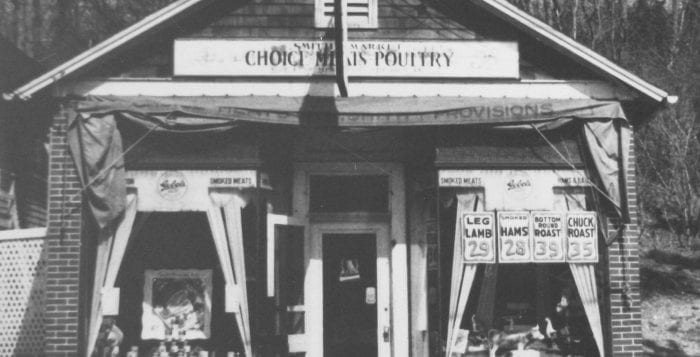By Beverly C. Tyler
In Stony Brook, before World War II and before the changes made by Ward Melville, there were stores and shops spread out along Main Street, Shore Road and Christian Avenue. Main Street in Stony Brook during the 19th and the early part of the 20th centuries was an active commercial area with a variety of shops.
South of Harbor Road and the mill pond there were several small homesteads and farms, a harness-maker’s shop and blacksmith shop, and a schoolhouse. The business area really began at the Grist Mill, and except for Jacinsky’s Saloon and a bakery opposite Harbor Road, all the stores were between the mill pond and the harbor. Shops included an ice cream parlor, drugstore, hardware store, tearoom, second-hand clothing store, Chinese laundry, a tailor shop and harness-maker’s shop that became a butcher shop and grocery store about 1900, a barbershop, livery stable, shoemaker’s shop, post office and at least two general stores.
The butcher in Stony Brook at the turn of the century was Orlando G. Smith. His brother, Charles E. Smith, ran a butcher shop and general store in East Setauket. Percy Smith, in his booklet “A Century of Progress,” noted that in the 1890s Stony Brook farmers began decreasing their livestock, and Orlando Smith had to buy meat from Bridgeport. His order was shipped by boat to Port Jefferson, loaded into a wagon and brought to Stony Brook. “During this time, Orlando bought what meat he could, but this had dwindled mostly to calves, lambs and pigs,” Percy Smith wrote. Born in 1892, he took over in 1913 the butcher business that had been owned for a short while by Capt. Robert F. Wells and then by Percy’s father, W.H. Smith.
In 1922 Percy Smith moved to a new location in the old post office building. A Stony Brook resident his entire life, he remembered in an interview in 1976 how the local families relied on each other for many of their necessities of life. The farmers supplied the food products, and the ship captains supplied transportation for the goods that were sold in New York City and Connecticut. The coastal schooners also brought to Stony Brook many items that were not grown or manufactured here. The merchants then bought and sold from both the farmers and the schooner captains. Smith noted that his grandfather Joseph Smith Hawkins, born 1827, used to make butter and take it to the store and trade it in and get groceries: “Farming used to be a mainstay of the village, plus the boats that used to bring things in and take things out. My grandfather used to cut and ship cordwood to New York City. The dock at Stony Brook used to be covered with hundreds of cords of wood.”
The 19th century brought many changes that affected the close interdependent relationship of the farmers, ship captains and merchants. The opening of the Erie Canal in 1825 and the subsequent building of canals brought coal for fuel from Pennsylvania and other states and hastened the decline of the use of cordwood for fuel in New York City. In addition, wheat and other grains from upstate New York and the Midwest were shipped on the Erie Canal and began arriving in New York City in large quantities. Most of the local grist mills found it difficult, if not impossible, to match the low price of Midwest grains and either adapted or went out of business. Percy Smith commented on these changes: “The older people died off and the younger ones didn’t want to bother with farming because they could make more money doing something else … so the farms were sold off.”
Thus, ended most of the small individual farms in the Three Village area. The local farmer was always a hardworking individual who took a great deal of pride in his work. The farms are gone but many of the farmhouses remain as witness to a lifestyle that has passed on.
Beverly C. Tyler is Three Village Historical Society historian and author of books available from the society at 93 North Country Road, Setauket. For more information, call 631-751-3730 or visit www.tvhs.org.





